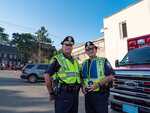


The pros and cons of migrating Manchester local police and fire dispatch services to a state-run, regional public safety operation were explored at a public hearing exploring public safety quality, cost controls, needed technology upgrades, and the value of local dispatchers with local knowledge. It also highlighted the current operating differences between Manchester’s fire and police departments.
Approximately 70 people attended the first of two planned Board of Selectmen public forums on the issue. Police Chief Todd Fitzgerald, Fire Chief Jason Cleary, and Finance Committee members were also on hand.
Manchester’s current dispatch, said Town Administrator Greg Federspiel, is handled by an “excellent staff doing an excellent job. But Manchester is facing jumps in costly police training mandates from the state as well as expensive upgrades to records management systems and computer aided dispatch software. The town, Federspiel said, must rethink how and where it spends its money.
“We are at a crossroad,” he said.
Dispatch configuration in Manchester costs $335,772 per year currently, after a 911 offset grant. One baseline dispatcher is on duty “24/7,” serving incoming calls for police, fire department and the DPW during off hours. In addition, three full time dispatchers work one of three daily shifts from Monday to Friday. Weekends are covered by part-time dispatchers, reserve officers or regular officers working overtime. For large incidents, a second dispatcher is called in, typically within 10-15 minutes. Dispatchers also serve as lobby receptionists, although in person visits to the station are infrequent. Manchester’s Fire Department has no lobby personnel.
Chief Cleary has publicly said he supports regionalized dispatch. Chief Fitzgerald, who grew up in Manchester, has not supported regionalized dispatch. But, said Fitzgerald, “this is not a fire versus police issue.” Above all, he said, his department and town residents deserve clarity.
“No matter what happens, and Cleary would agree, our records management system and computer aided dispatch software has to be addressed. Whatever decision we make has to be confident. (Indecision is) not good for morale, or a good working relationship between the two departments.”
A regionalized dispatch model tends to benefit smaller towns, giving them personnel, they wouldn’t be able to hire themselves. Currently, North Andover and Ipswich are considering joining the NSR911 center. But others, like Georgetown, that are sized similarly to Manchester have decided to go it alone and are happy with the decision.
The prospect of moving to North Shore Regional 911 (NSR911) is a tempting one for the BOS. The state is offering Manchester the service free for the first 10 years to join the four other towns (Essex, Wenham, Middleton, Topsfield and Amesbury) in the consortium. The center uses a minimum of four 24/7 dispatchers, based on call volume. (More towns, more calls would prompt the center to add dispatchers.) The dispatch center would also cover harbormaster 911 calls, and off hours DPW calls.
Regional 911 cell service is a separate service from regionalized local dispatch.
Many opponents of regional dispatch at the forum emphasized the value of local “small town” familiarity that comes when local personnel services local communities.
“I can’t see how a regional system could possibly know nooks and crannies and postmarks (required) to quickly respond to and identify a situation in the street or with a family in very short order,” said resident Anton Kobis.
Mark Bruno is a Manchester resident and a lieutenant with the Amesbury Fire Dept. He said it’s no secret that Amesbury hasn’t been “exactly happy” with NSR911, although the town remains in the consortium. He asked if Manchester would consider keeping police dispatch in house and move fire dispatch to one pooled with a neighboring town, such as Beverly.
Bruno said a common complaint of NSR911 among firefighters is the center can’t monitor the “fire ground” tactical channels used by Amesbury and other North Shore and southern New Hampshire towns.
“I hope Manchester doesn’t have some of the issues we have had,” he said.
The fire ground frequency issue is a known concern, according to Cleary, and is in the process of being added into the regional dispatch consoles.
Resident Sheila Pidgeon Hill asked what she dubbed a “gold standard” question. If an additional million dollars is needed to stay local and get both the police and fire departments up to speed with all their needs, she asked, why not do it. A million dollars is approximately three percent of the town’s annual $36 million budget.
“I don’t see why this community can’t annually commit three percent to police and fire safety,” she said.
Federspiel responded that another million would bring the public safety budget to $4 million. If that’s what the town chooses, he said, that’s a valid choice.
“All the options are on the table,” said Federspiel.
The Finance Committee was asked to provide options for lobby services. 24/7 lobby reception for non-emergency calls would cost $290,000/year. Eliminating the midnight shift (the “2/3 option”) is $192,000/year. And 12 hour per day coverage is $135,000/year. Virtual lobby monitoring (via an app, as is done in Essex) is included in regionalization and would cost nothing.
Sarah Mellish, chairman of the Finance Committee said her committee recommended the 2/3 option or the 12-hour option.
A resident from Pine Street said residents should have access to a clear, financial comparison.
“A five-year financial plan looking at the details, characterized by level of service expected, would be helpful to better understand that we are comparing ‘apples to apples’,” she said. “When these regional service agreements going forward, and they go wrong, it’s because of misaligned expectations.”
Selectman John Round agreed.
“We need to look at that, and put it together,” he said.
The BOS will hold another public forum later this summer, and a decision by the BOS will be made sometime before the end of September.